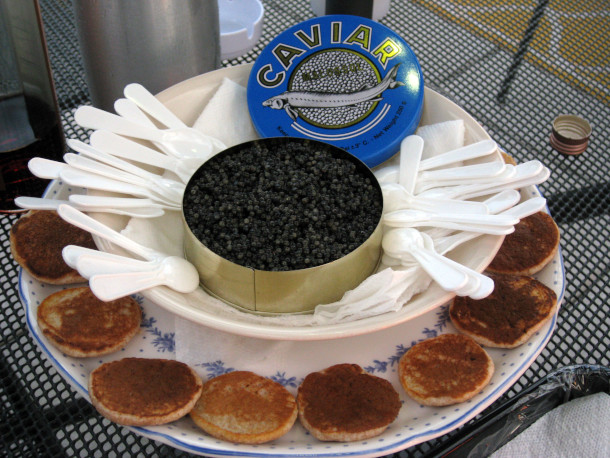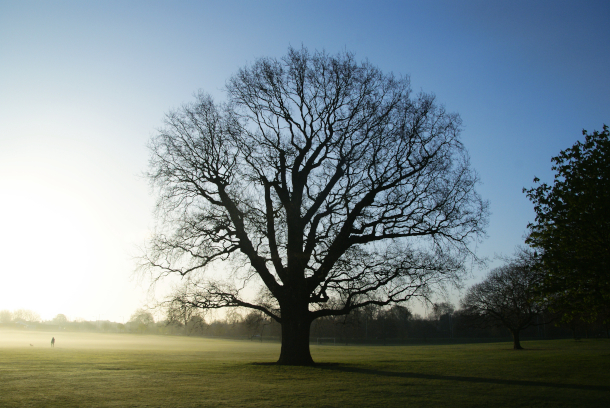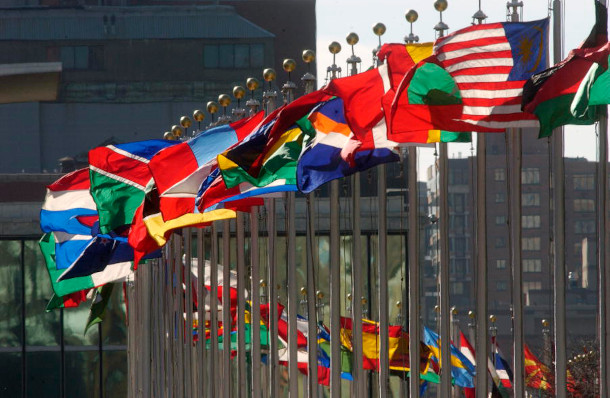Beyond the Headlines
Air Date: Week of June 3, 2022

The US Fish and Wildlife Service is proposing placing four species of sturgeon on the Endangered Species list. Sturgeon, which are present in the Caspian Sea as well as other large river systems in Europe such as the Danube, produce coveted caviar, or fish eggs. (Photo: Veronica, Flickr, CC BY-NC 2.0)
On this week’s trip beyond the headlines, Environmental Health News Editor Peter Dykstra and Host Jenni Doering take us all the way to the Caspian Sea, where four species of caviar-bearing sturgeon may soon receive a U.S. endangered species listing. They next take a look at the legacy of the late environmental economist Hazel Henderson, who popularized the slogan “think globally, act locally.” Finally, the two dive into the history books to consider the thirtieth anniversary of the Rio Earth Summit.
Transcript
CURWOOD: It’s Living on Earth, I’m Steve Curwood.
DOERING: And I'm Jenni Doering.
It's time now to take a look beyond the headlines with Peter Dykstra. Peter's an editor with environmental health news. That's ehn.org and dailyclimate.org. And he's on the line from Atlanta, Georgia. Hey, Peter, how's it going this week?
DYKSTRA: Oh, hi, Jenni. There's some news coming out of the Caspian Sea region, what's lately been a strife-filled region of the world. But the US Fish and Wildlife Service is looking at potentially slapping an endangered listing on four different species of caviar-bearing sturgeon. They're anadromous fish. They live much of their lives in saltwater, part of their lives when they spawn in freshwater, big European rivers like the Danube system and others. A lot of the sturgeon in the Black Sea have already been wiped out. The Caspian Sea has been the center of the caviar business.
DOERING: Peter, that region's been in the headlines a lot recently with Russia's invasion of Ukraine. How does that bode for these sturgeon that are potentially endangered?
DYKSTRA: It's tempting to think of sturgeon as being a political tool in this major crisis. That is probably not the case because the Russians are not the only ones that harvest sturgeon for caviar or for meat. All of the countries that surround the Caspian Sea are in the sturgeon business. This is an effort to at least identify and remind the world that caviar and the sturgeon they come from are still under extreme stress.
DOERING: What else do you have for us this week?

Hazel Henderson famously challenged the status quo in the field of economics, arguing that we should move beyond profit maximization and consider the environmental and social costs of our actions. (Photo: Martin Sveden, Flickr, CC BY 2.0)
DYKSTRA: We've got an item from the obituary column, unfortunately. A great, great environmental thinker, and environmental economist, you don't hear that too often. But Hazel Henderson, made the mold and also for most economists, broke the mold, looking at the "dismal science" in a way that's a lot less dismal. She wanted to make sure that in dealing with economics, we didn't just look at the bottom line and the profitability for companies. But we looked on how they affected the quality of life for all of us. She taught her followers to think globally, and act locally. She didn't coin that phrase, but it was the theme of her life's work. And she certainly helped popularize that phrase.
DOERING: Yeah, well, I have to say, I hadn't actually heard of Hazel Henderson before. But sounds like she was one of those unsung heroes of the environmental movement.
DYKSTRA: She is, and she'll probably be more respected and widely read in death than she was in life. But she really left a mark on a part of environmental science and politics, that so many of us pay very, very little attention to.
DOERING: So think globally, act locally. I'll think of Hazel The next time I hear that phrase. Hey, Peter, what do you have from the history vaults this week?
DYKSTRA: June 3, 1992, the Rio Earth Summit, the United Nations Conference on Environment and Development, opened in Rio de Janeiro, Brazil. The delegates there from around the world agreed on several things, a statement on forest principles, the United Nations Convention on Biological Diversity, and it also set up the UN Framework Convention on Climate Change. That's something that's led to a series of meetings over 30 years. The question remains, 30 years down the line, how much progress have we really made?

Annual Conference of the Parties (COP) meetings were born out of the Rio Earth Summit in Rio de Janeiro, Brazil, which took place thirty years ago this month. (Photo: United Nations Photo, Flickr)
DOERING: It's a really good question, Peter. Here in 2022, we really don't have 30 more years to mess around with far-off plans for solving climate change and the biodiversity crisis.
DYKSTRA: That's right. The solutions are in short supply. The urgency is huge. And we're still talking a better game than we're actually doing, thirty years after Rio.
DOERING: Thanks as always, Peter. Peter Dykstra is an editor with Environmental Health News. That's ehn.org and daily climate.org. We'll talk to you next time, Peter.
DYKSTRA: All right, Jenni, thanks a lot, and we'll talk to you soon.
DOERING: And there's more on the stories on the Living on Earth website. That's loe.org.
Links
E&E News | “Feds Propose Listing Russian Sturgeon, A Fish Now In A War Zone”
The New York Times | “Hazel Henderson, Groundbreaking Environmentalist, Dies at 89”
Living on Earth wants to hear from you!
Living on Earth
62 Calef Highway, Suite 212
Lee, NH 03861
Telephone: 617-287-4121
E-mail: comments@loe.org
Newsletter [Click here]
Donate to Living on Earth!
Living on Earth is an independent media program and relies entirely on contributions from listeners and institutions supporting public service. Please donate now to preserve an independent environmental voice.
NewsletterLiving on Earth offers a weekly delivery of the show's rundown to your mailbox. Sign up for our newsletter today!
 Sailors For The Sea: Be the change you want to sea.
Sailors For The Sea: Be the change you want to sea.
 Creating positive outcomes for future generations.
Creating positive outcomes for future generations.
 Innovating to make the world a better, more sustainable place to live. Listen to the race to 9 billion
Innovating to make the world a better, more sustainable place to live. Listen to the race to 9 billion
 The Grantham Foundation for the Protection of the Environment: Committed to protecting and improving the health of the global environment.
The Grantham Foundation for the Protection of the Environment: Committed to protecting and improving the health of the global environment.
 Contribute to Living on Earth and receive, as our gift to you, an archival print of one of Mark Seth Lender's extraordinary wildlife photographs. Follow the link to see Mark's current collection of photographs.
Contribute to Living on Earth and receive, as our gift to you, an archival print of one of Mark Seth Lender's extraordinary wildlife photographs. Follow the link to see Mark's current collection of photographs.
 Buy a signed copy of Mark Seth Lender's book Smeagull the Seagull & support Living on Earth
Buy a signed copy of Mark Seth Lender's book Smeagull the Seagull & support Living on Earth

